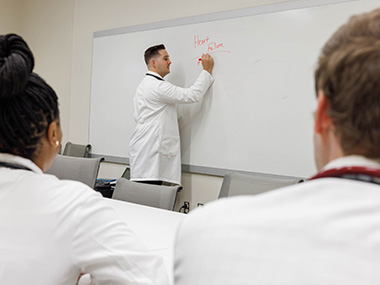Curriculum
- Department of Medicine
- About Department of Medicine
-
Specialties
- Cardiology
- Clinical Immunology
- Digestive Diseases
- Endocrinology
- General Internal Medicine
- Geriatrics
- Hematology and Oncology
- Hospital Medicine
- Infectious Diseases
- Nephrology
- Palliative and Supportive Care
- Pulmonary, Critical Care and Sleep Medicine
- Genetics and Genomics
-
Education Programs
- Student Programs
-
Internal Medicine Residency Program
- Internal Medicine Residency Program Home
- About the Program
- Residents
- Applicants
- Social Media
- Medicine/Pediatrics Residency Program
- Fellowship Programs
- Board Review Course
- Research
Main Content
 Residents at UMMC have a wide variety of educational experiences in the clinic and on the inpatient wards as the primary physician or as the consultant. Monthly rotations in the intern year of training are weighted towards inpatient experiences as a part of the primary team, while the R2 and R3 years shift more to consultant, outpatient, and elective experiences.
Residents at UMMC have a wide variety of educational experiences in the clinic and on the inpatient wards as the primary physician or as the consultant. Monthly rotations in the intern year of training are weighted towards inpatient experiences as a part of the primary team, while the R2 and R3 years shift more to consultant, outpatient, and elective experiences.
To supplement direct patient care education, residents participate in a daily morning report led by the chief resident, attend daily noon conferences that cover both core curriculum and board preparation, complete monthly online ambulatory modules, produce scholarly activity in close cooperation with fellows and attendings, and participate in quality improvement projects. These additional educational activities provide our residents with deeper knowledge in a variety of areas, opening doors for a wider selection of career opportunities upon completion of training.
Throughout all of these experiences, the primary goal of our education is to prepare each resident for independent practice in both the inpatient and the outpatient setting. To ensure we accomplish this goal, the program leadership and the faculty focus on giving honest feedback and both verbal and written evaluations of performance. Additionally, we place an emphasis not only on faculty led discussions of core concepts of medicine, but also on residents becoming excellent teachers of those concepts. We encourage students, residents, and fellows to engage in independent reading of the literature, to share that knowledge with their colleagues, and to apply it in a professional, patient-centered manner.
Curriculum
 Residents at UMMC have a wide variety of educational experiences in the clinic and on the inpatient wards as the primary physician or as the consultant. Monthly rotations in the intern year of training are weighted towards inpatient experiences as a part of the primary team, while the R2 and R3 years shift more to consultant, outpatient, and elective experiences.
Residents at UMMC have a wide variety of educational experiences in the clinic and on the inpatient wards as the primary physician or as the consultant. Monthly rotations in the intern year of training are weighted towards inpatient experiences as a part of the primary team, while the R2 and R3 years shift more to consultant, outpatient, and elective experiences. To supplement direct patient care education, residents participate in a daily morning report led by the chief resident, attend daily noon conferences that cover both core curriculum and board preparation, complete monthly online ambulatory modules, produce scholarly activity in close cooperation with fellows and attendings, and participate in quality improvement projects. These additional educational activities provide our residents with deeper knowledge in a variety of areas, opening doors for a wider selection of career opportunities upon completion of training.
Throughout all of these experiences, the primary goal of our education is to prepare each resident for independent practice in both the inpatient and the outpatient setting. To ensure we accomplish this goal, the program leadership and the faculty focus on giving honest feedback and both verbal and written evaluations of performance. Additionally, we place an emphasis not only on faculty led discussions of core concepts of medicine, but also on residents becoming excellent teachers of those concepts. We encourage students, residents, and fellows to engage in independent reading of the literature, to share that knowledge with their colleagues, and to apply it in a professional, patient-centered manner.


